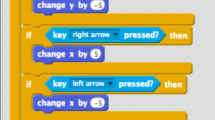Abstract
This article discusses (a) the potential advantages of learning computer programming, (b) the performance of males and females in middle school programming courses, (c) the problems teachers face in achieving this potential, and (d) the participation of males and females in programming courses. Females comprise about 40% of the students enrolled in middle school programming courses. They perform, on the average, as well as or better than the males, and comprise 60% of the most talented students. Significantly, neither males nor females make very much progress in learning to program and, therefore, in acquiring any of the general cognitive skills which might potentially result from programming courses.
Similar content being viewed by others
References
Anderson, R. C. Some reflections on the acquisition of knowledge. Educational Researcher, 1984, 13, 5–10.
Becker, J. School uses of microcomputers (Nos. 1–3). Baltimore: Center for Social Organization of Schools, The Johns Hopkins University, 1983.
Bork, A. Learning with Computers. Bedford, Mass.: Digital Press, 1981.
Campbell, P. Hidden equity: Incorporating equity in existing computer-based programs. Paper presented at the annual meeting of the Special Interest Group: Research on Women and Education, American Educational Research Association, Los Angeles, 1984.
Clancy, M. Experience with the lab model for introductory programming instruction. Talk given at University of California at Irvine, 1983.
Cooper, D., & Clancy, M. Oh! Pascal!. New York: Norton, 1982.
Dalbey, J., & Linn, M. C. The demands and requirements of computer programming: A literature review. Journal of Educational Computing Research, in press. (a)
Dalbey, J., & Linn, M. C. Cognitive consequences of programming: Augmentation to BASIC instruction. Journal of Education Computing Research, in press. (b)
Dalbey, J., Tourniaire, F., & Linn, M. C. Making programming instruction cognitively demanding An intervention study (ACCCEL Report). Berkeley: University of California, Lawrence Hall of Science, 1984.
Hess, B., & Muira, I. Sex differences in computer access. Forum for Academic Computing and Teaching Systems, 1983, 2(1), 3.
Kurland, D. M., Mawby, R., & Cahir, N. The development of programming expertise in adults and children. Paper presented at the annual meeting of the American Educational Research Association, New Orleans, 1984.
Lepper, M. R. Microcomputers in education: Motivational and social issues. American Psychologist, 1985, 40, 1–18.
Leuhrmann, A., & Peckham, H. In Computer literacy: A hands-on approach. New York: McGraw-Hill, 1983.
Linn, M. C. Equity in computer education: Current concerns. Computers and the Social Sciences, 1985, 1, 19–27.
Linn, M. C., & Dalbey, J. Cognitive consequences of programming instruction: Influence of instructional setting, student access, and student ability. Educational Psychologist, in press.
Linn, M. C., & Fisher, C. W. The gap between promise and reality in computer education: Planning a response. In Making our schools more effective. San Francisco: Far West Laboratories, 1984.
Mandinach, E., & Fisher, C. W. Individual differences and acquisition of computer programming skill (ACCCEL Report). Berkeley: University of California, Lawrence Hall of Science, 1985.
Mandinach, E., & Linn, M. C. Characteristics of experienced and talented programmers in middle schools (ACCCEL Report). Berkeley: University of California, Lawrence Hall of Science, 1985.
National Science Board, Commission on Precollege Education in Mathematics, Science and Technology. Educating Americans for the 21st century. Washington, D.C.: National Science Foundation, 1983.
Raven, J. C. Advanced Progressive Matrices, Set I. New York: Psychological Corporation, 1958.
Schubert, J. G. Females and microcomputer use in school: Some insights into traditional patterns. Paper presented at the annual meeting of the Special Interest Group: Research on Women and Education, American Educational Research Association, Los Angeles, 1984.
Vetter, B. Manpower Comments, 1983, 20(1) 29.
Webb, N. M. Problem-solving strategies and group processes in small groups learning computer programming. Paper presented at the annual meeting of the American Educational Research Association, New Orleans, 1984.
Author information
Authors and Affiliations
Additional information
This material is based upon research supported by the National Institute of Education, Grant No. 400-83-0017. Any opinions, findings, conclusions, or recommendations expressed in this publication are those of the author and do not necessarily reflect the views of the National Institute of Education. Special thanks are due to John Dalbey, Charles Fisher, Ellen Mandinach, Joanne Stein, and other members of the ACCCEL staff for helpful discussions of these issues.
Rights and permissions
About this article
Cite this article
Linn, M.C. Fostering equitable consequences from computer learning environments. Sex Roles 13, 229–240 (1985). https://doi.org/10.1007/BF00287913
Issue Date:
DOI: https://doi.org/10.1007/BF00287913




